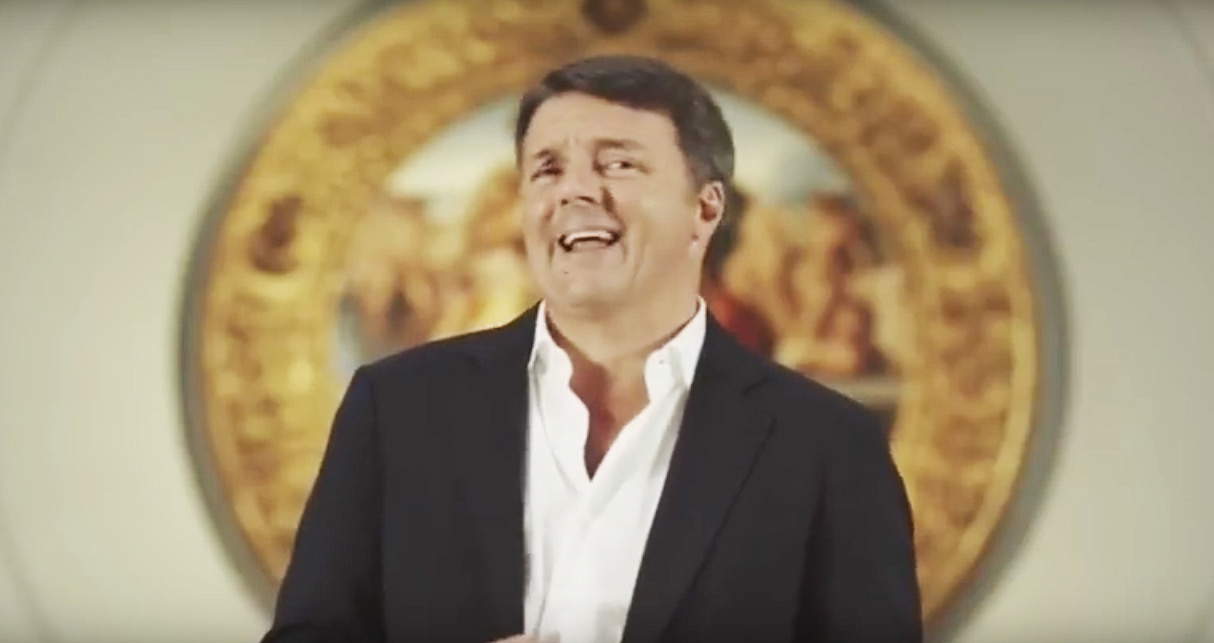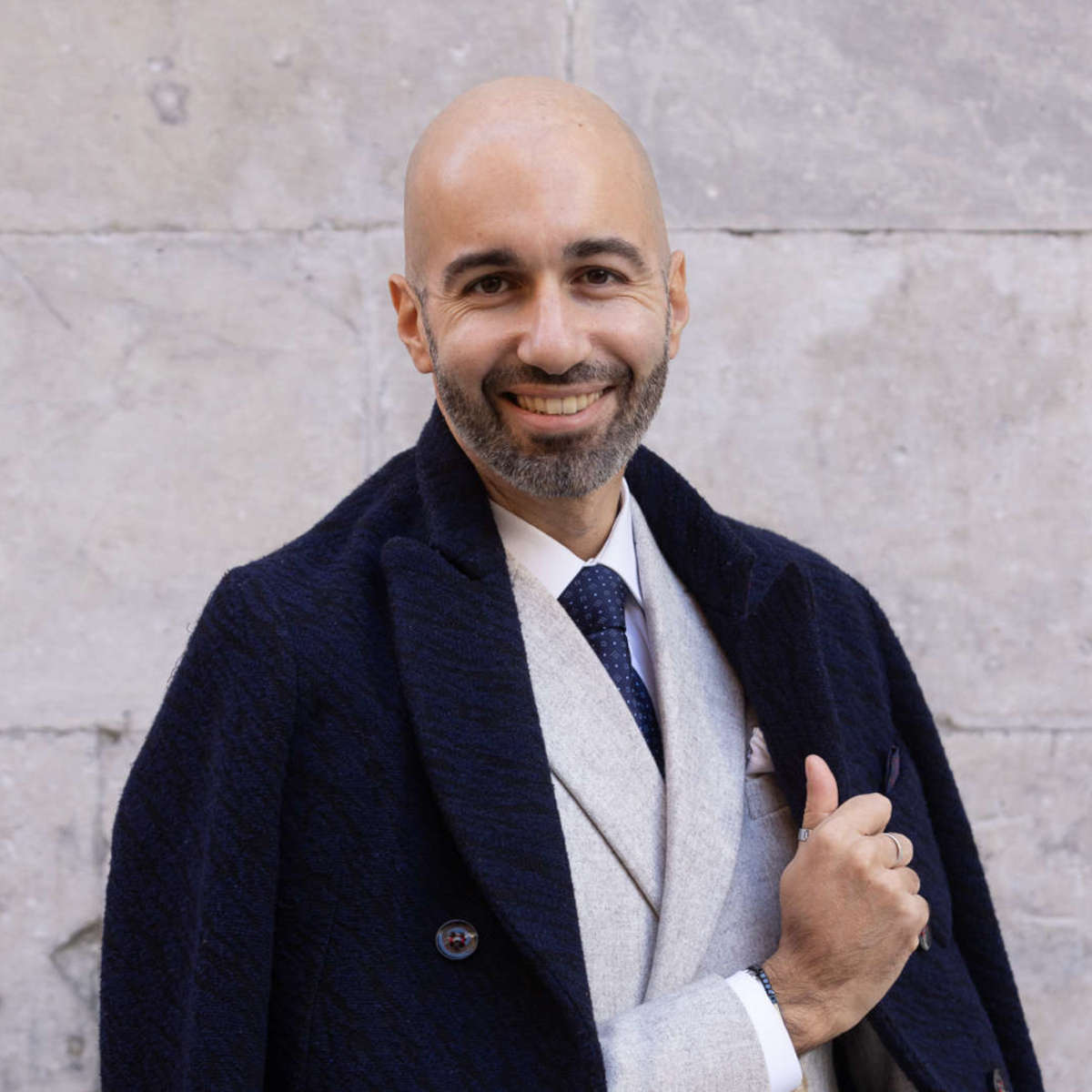Surely many of those reading this article will have had a chance to see the trailer for Florence, the documentary that intends to take viewers on a discovery of Florence, with the guidance of former Prime Minister Matteo Renzi. And not a few will have noticed how clumsy this attempt is: Renzi who, in his mimicry and modes of expression, does nothing but ape Alberto Angela, his figure covering Michelangelo ’s Tondo Doni almost in its entirety (it happens even at the very moment when Renzi introduces the work to the poor viewer, who would like to see its details but is forced to put up with the poorly done imitation), the shoddy content (of course, it is impossible to judge from a one-and-a-half minute preview: but one cannot help but notice that the first thing Renzi reports about the Tondo Doni is a rumor concerning the price of the work). In short, it is futile, superfluous, and tremendously trivial to attempt to comment more in depth on the operation: it would be like launching a carpet bombing on the Red Cross. Much more interesting, however, is to understand why several politicians have decided, for some time now, to give themselves to cultural activities.
 |
| Matteo Renzi in a still from the trailer for Florence |
Now, Italy, from Unification onward, has a very long tradition of cultural personalities who, in the course of their lives, decided to put themselves at the service of the country and sit for some time among the benches of Parliament. Poets (Gabriele d’Annunzio, Giosuè Carducci, Eugenio Montale), writers (Antonio Fogazzaro, Giovanni Verga, Ignazio Silone) journalists (Salvatore Morelli, Filippo Meda) philosophers (Benedetto Croce, Norberto Bobbio), historians (Gaetano Salvemini, Rosario Villari), art historians (Giovanni Morelli, Giulio Carlo Argan, the latter also mayor of Rome). Then there were poets and writers who began their careers in the name of literature and then gave themselves almost entirely to politics (the most illustrious example that comes to mind is Felice Cavallotti). And there were also those who managed to conduct both political and cultural activities in parallel, and successfully: think of Paolo Emilio Taviani. The reverse path, that of professional politicians who lend themselves to culture, is, on the other hand, a relatively recent occurrence, which can, however, already rest on an important cornerstone: Giulio Andreotti, an unsuspected author of fiction, whose forgotten historical account(1 p.m., the minister must die, centered around the assassination attempt on Pellegrino Rossi) can be cited, among others. Wanting to go further back in time, one might also recall Emilio Lussu, who landed on the written word (particularly historical studies) well after taking up political activity (although, in Parliament, he would arrive later). However, compared to those of current politicians, Andreotti’s writings presupposed a certain political commitment and, above all, were lost in a dense swarm of publications of a political nature, while Lussu’s responded to avery high historical necessity, namely that of recounting, in the first person and with the tools that his culture made available to him, certain facts that the author had experienced as a protagonist (which is why his dense writings on the First World War are important readings on the subject). The same cannot be said of today’s poets, writers, documentarians and filmmakers.
The phenomenon of politicians with cultural vagueness has exploded in recent years, so much so that it prompts us to wonder whether such poor-quality products are a reflection of equally unexciting politics. Avoiding a discussion of Florence with Matteo Renzi, since, I repeat, no conclusions can be drawn from a minute and a half preview (but the premises do not bode well), we can instead cite well-known cases such as Sandro Bondi’s ramshackle poems, Nichi Vendola’s equally atrocious ones, Dario Franceschini’s sloppy novels, and Mario Adinolfi’s useless booklets. So, the causes of such proliferation could be twofold. The first is of an individual order: the operations listed above are likely attempts to ensure a kind of cultural legitimacy to the parliamentary activity of the aforementioned politicians, as if they feel the need to go beyond the seat (if the politician has something interesting to say, and to his thought he decides to give a literary form, then according to a certain kind of perception his political activity will also be ennobled). Then, in Renzi’s case, add to this the pride, typical of Florentines (including provincial Florentines), in the “beauty” of their city (or their capital city): even his previous writings on political current affairs are stuffed with platitudes about “beauty” that “produces awe and admiration” (this is a phrase of Renzi’s from Stil novo: It is followed immediately by a description of a Vasari fresco depicting the Battle of Gavinana in 1530, but the former mayor of Florence confuses Gavinana in the mountains of Pistoia with the district of the same name in the Tuscan capital, a sign that perhaps his attention to and knowledge of his own city’s historical facts was not a good basis for allowing him to conduct a documentary on Florence). And then there is perhaps the desire to fit into the tradition of those who have successfully conducted both literary and political activity, although, in all likelihood, today’s politicians do not realize that they are starting in reverse, that is, giving life mid-career, or at the end of their careers depending on the mood of the upcoming elections, to an activity that for others constituted the starting point, as indeed is only right, since it is literary, journalistic, artistic (in a word: cultural) that should serve as a spur for political activity, not vice versa.
The second reason is more general. In Italy, the book market is growing; the figures for overall book sales in 2017 mark an increase compared to 2016, which in turn had recorded higher numbers than in 2015 (the data can be found on the website of the Italian Publishers Association). The problem is that a numerical increase in the quantity of readers and also in the quantity of books published (look at the IEA graph: in 2017 new books were three times as many as in 1980), would seem not to be matched by an increase in the quality of what is published. This is the situation that, in an article he authored in 2014 (a time when the aftermath of the crisis had, on the contrary, led to a sharp decline in readership) in Fatto Quotidiano, Luca Formenton, one of Italy’s leading publishers, lamented: quoting a phrase by Carlos Fuentes (“we need to create readers, not just give them what they want”), Formenton recalled that “years of managerial philosophy applied to publishing may have produced profits in the short term for large groups, but they have certainly contributed to the progressive desertification of the reader,” populating bookstores with “serial best sellers,” low literature, shoddy consumer products. So, the literary, historical-artistic, theatrical and so on velleities of today’s politicians, probably abound also because a situation has been produced in which the “desertification of the reader” Formenton spoke of fails to put up a check against the publication and presentation of the reckless and cheesy parts of the fertile minds of many parliamentarians (also accomplice is a certain press, indeed increasingly widespread, which often forgets to exercise its critical functions: it is worth pointing out).
So, let our administrators leave it at that: banish them to the new lives of improbable prose writers, of Sunday vati, of polished TV hosts. Politicians, and especially professional politicians, are asked to do two things: the first is to administer well and the second, in case they want to pour their ideas on paper, is their reading of the world (Berlinguer or Spadolini proposed it to us in the past and Enrico Letta, Cacciari or Brunetta, for example, are proposing it to us today, three politicians who, moreover, start from solid academic bases). But let them avoid devoting themselves to areas that do not belong to them. We say this especially for them.

The author of this article: Federico Giannini
Nato a Massa nel 1986, si è laureato nel 2010 in Informatica Umanistica all’Università di Pisa. Nel 2009 ha iniziato a lavorare nel settore della comunicazione su web, con particolare riferimento alla comunicazione per i beni culturali. Nel 2017 ha fondato con Ilaria Baratta la rivista Finestre sull’Arte. Dalla fondazione è direttore responsabile della rivista. Nel 2025 ha scritto il libro Vero, Falso, Fake. Credenze, errori e falsità nel mondo dell'arte (Giunti editore). Collabora e ha collaborato con diverse riviste, tra cui Art e Dossier e Left, e per la televisione è stato autore del documentario Le mani dell’arte (Rai 5) ed è stato tra i presentatori del programma Dorian – L’arte non invecchia (Rai 5). Al suo attivo anche docenze in materia di giornalismo culturale all'Università di Genova e all'Ordine dei Giornalisti, inoltre partecipa regolarmente come relatore e moderatore su temi di arte e cultura a numerosi convegni (tra gli altri: Lu.Bec. Lucca Beni Culturali, Ro.Me Exhibition, Con-Vivere Festival, TTG Travel Experience).
Warning: the translation into English of the original Italian article was created using automatic tools. We undertake to review all articles, but we do not guarantee the total absence of inaccuracies in the translation due to the program. You can find the original by clicking on the ITA button. If you find any mistake,please contact us.